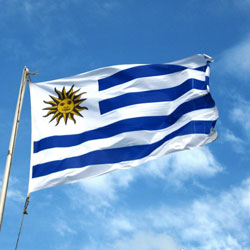
Uruguay is taking unusual steps to take advantage of the divergence in monetary policy across the world and diversify currency risk in its funding portfolio. Bucking the trend of Latin American sovereigns issuing euro denominated bonds, Uruguay is contemplating swapping some its existing dollar debt into the European currency.
It may use some of the proceeds from its recent global bond for the swap.
What may sound like a racy strategy is in fact about reducing risk, Herman Kamil, director of public credit for the South American country, told GlobalMarkets. Favourable cross-currency basis swaps and lower yields in the euro market make it a doubly attractive option.
“We have previously carried out swaps from dollars into pesos, but that swap market is thin,” said Kamil. “So we’ve decided to try to swap at least a small part our dollar debt into other hard currencies.
“This is not speculative; we are doing it from a risk management perspective. It allows us to reduce currency risk and at the same time take advantage of lower interest rates in other currencies.”
Uruguay has already swapped a $500m dollar loan from the World Bank into Japanese yen, using the World Bank itself as the counterpart, for the swap, said Kamil.
By swapping the liabilities from dollars into yen, the government was able to lock in negative interest rates.
CURRENCY MOVES
As the public credit head admits, whether these swaps end up being cheaper or not ultimately depends on movements in these currencies. But it is not only about cost: Uruguay exports goods to Europe, so it is a natural hedge for the economy.
“We plan to deepen our strategy of diversifying the currency risk within our hard currency portfolio,” said Kamil. “We want exposure to the dollar, yen and euro.”
The most obvious way to do this would be to issue in these currencies. Mexico is a frequent issuer in yen, while Mexico, Chile, Peru and Colombia have all issued euro denominated bonds in the last two years. And Argentina made its comeback to the euro market after 15 years on Wednesday with a €2.5bn deal.
But on a post-swap basis, these bonds usually trade well wide of each issuer’s dollar curve. In other words, it is cheaper to issue in dollars and swap the proceeds into euros than it is to issue in euros.
“What is favourable is not only the interest rate differential but also the cross-currency basis swap,” says Kamil.
As Uruguay has easy access to dollar markets, it is far more straightforward for the country to take advantage of issuance windows in the US than in a euro market it has not visited in a decade, he said.
